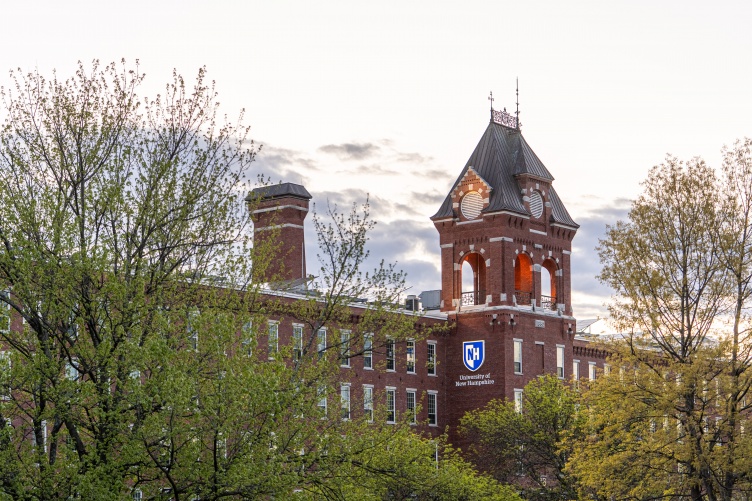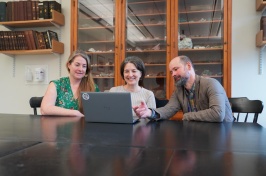
The University of New Hampshire has partnered with Pinkerton Academy to launch UNH First Step, a two-year pilot concurrent credit program. Beginning this fall, Pinkerton juniors and seniors will have the opportunity to simultaneously earn high school and UNH credit in select high school courses.
“As the state’s flagship public university, we are committed to building partnerships that foster education at every age,” said Wayne Jones, UNH provost and vice president for academic affairs. “UNH First Step brings high school and college educators together with the shared goal to advance academic excellence and opportunity for New Hampshire students.”
Jones says Pinkerton was a natural fit for the partnership given the quality of faculty and curricular offerings in many subjects, including communications and computer science. Timothy Powers, headmaster of Pinkerton Academy, echoed that sentiment.
“We are always seeking to improve the quality of learning and teaching at Pinkerton, and UNH is a key partner in that mission,” Powers said.
“Our ultimate goal is to make college more accessible to New Hampshire students. When students choose to stay here, they become part of the workforce engine that strengthens our state’s economy.”
Through UNH First Step, New Hampshire high school students can earn UNH credit in their high school computer science and communication arts courses. Pinkerton teachers have worked with faculty from UNH Manchester to develop courses that align high school learning activities with UNH academic rigor and expectations.
Mihaela Sabin, professor of computer science at UNH Manchester, has been actively involved in expanding computer science education in the state’s K-12 system. She says UNH First Step furthers that commitment by increasing opportunities to broader participation in college-level curriculum.
“Computing careers are in high-demand in New Hampshire and nationally, so building computer science into the curriculum early on is crucial,” Sabin said, adding that computer science is now a core component of K-12 education in the state thanks to a bill passed into law last year. “This collaboration not only improves the implementation of the new curricular standards, but also supports and empowers students to learn computing skills that they can carry into their college and professional careers.”
Through a thorough analysis of research, What Works Clearinghouse found strong evidence that concurrent credit programs improve the transition to college as well as degree attainment, particularly for students who are traditionally underrepresented in higher education. UNH Manchester Dean Mike Decelle says expanding UNH First Step to more New Hampshire high schools could encourage students to go to college, particularly in New Hampshire.
“Our ultimate goal is to make college more accessible to New Hampshire students,” Decelle said. “When students choose to stay here, they become part of the workforce engine that strengthens our state’s economy.”
According to a 2018 report by the National Center for Education Statistics, 61 percent of New Hampshire high school graduates leave the state to pursue their four-year degrees. The key to lowering that statistic is building stronger pathways to the state’s post-secondary institutions, says New Hampshire Department of Education Commissioner Frank Edelblut.
“By enabling students to earn college credit in their own high school classrooms, programs like UNH First Step pave the way to academic opportunities at our in-state institutions,” Edelblut said. “Expanding academic options for New Hampshire students creates more paths to bright futures.”
UNH First Step Frequently Asked Questions
1. What is the goal of the UNH First Step program?
Economic development is at the core of the University’s mission, and UNH First Step directly supports one of UNH’s recently announced four strategic priorities: Embrace New Hampshire. The long-term objective of UNH First Step is to encourage New Hampshire students to pursue their education and career in the state by fostering academic opportunities at every education level. By providing New Hampshire high school students with the opportunity to earn early University credit, the goal is to increase interest in and accessibility to four-year colleges and universities in the state.
2. How does UNH First Step differ from Running Start?
UNH and the Community College System of New Hampshire (CCSNH) have a shared mission to expand academic options for New Hampshire students. Both programs bring college-level courses into New Hampshire high school classrooms to enable students to simultaneously earn high school and college credit. Running Start participants earn Community College System of New Hampshire credits and UNH First Step participants earn UNH credits, both of which are accepted at a wide variety of institutions. Both programs are available to high school juniors and seniors, however, to align with UNH admission standards, UNH First Step participants must have an overall “B” average and be on track to be admissible to a four-year college. During the pilot, UNH First Step will only be available at high schools where UNH faculty have an ongoing relationship, such as serving on an advisory board or as a mentor to high school faculty. Students in both programs may benefit from lower tuition costs, an opportunity to complete higher education requirements in less time and a smoother transition from high school to college.
3. Will UNH First Step be extended to other high schools?
During the two-year pilot, UNH Manchester and the College of Engineering and Physical Sciences (CEPS) in Durham will work with several high schools in their respective locales. UNH Manchester communication arts and computer science faculty have partnered with Pinkerton Academy for the initial launch and are working closely with two other high schools on similar curricula. Computer science faculty from CEPS are also in the process of identifying three seacoast-area high schools to participate. Once the two-year pilot is successfully completed, the goal is to continue to expand to high schools throughout the state.
4. Will UNH First Step expand beyond communication arts and computer science course offerings?
Once the two-year pilot is complete, other UNH programs that can identify and build curricular alignment with high school departments will be able to participate with the approval of the Provost’s Office.
5. What does the program cost?
UNH First Step participants will pay $150 per 4-credit course. The program is the same cost to students as Running Start.
6. How will UNH measure success?
The success of the pilot will be determined by the number of students who choose to enroll in UNH courses and by the academic success of those students to complete the courses. Once the pilot is extended and expanded, as intended, the most important metric will be the percentage of New Hampshire high school graduates who choose to pursue higher education and careers in the state.
-
Written By:
Kassidy Taylor | Marketing & Communications, UNH Manchester | kassidy.taylor@unh.edu





















































